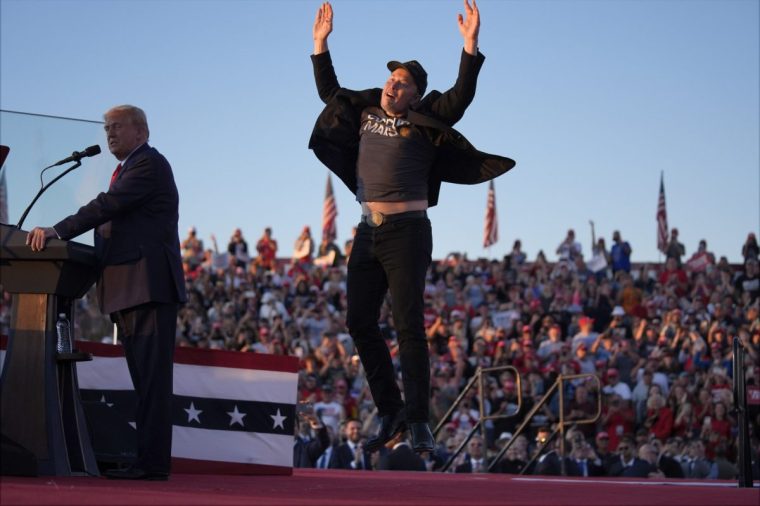Elon Musk, the richest man on Earth, has got a lot riding on Donald Trump winning the US election.
“If he loses, I’m f**ked,” he said in an interview this month with ex-Fox News host Tucker Carlson, as they both giggled about how much he has been “trashing” Vice President Kamala Harris “nonstop”.
With polls indicating both Harris and Trump virtually neck and neck in the White House race, Musk’s considerable social media presence – particularly on his platform X – and influence in the tech industry could have major implications for the tightly contested election.
It raises the question of what Musk is banking on with Trump. The interstellar entrepreneur, worth an estimated $246bn, and the Republican nominee have been almost inseparable throughout Trump’s 2024 presidential run, and even more so in the final weeks leading up to the election. He is arguably a more recognisable face in the Republican campaign than Trump’s running mate, JD Vance, whose popularity rating has only just recovered after a months-long dip.
Dressed in a T-shirt bearing the words “occupy Mars”, Musk made a surprise appearance at a Trump campaign rally in Butler, Pennsylvania on 5 October, some three months after an assassination attempt against the former president at that location. A photo from the event shows Musk jumping for joy on stage, midriff bare and arms aloft.

Musk has donated about $75m (£58m) to his pro-Trump super political-action committee (PAC) in the three months up to the end of September, and was the sole donor of the spending group in that period.
America PAC, which Musk founded in the spring with a focus on turning out voters in swing states, has spent $72m (£55m) of his contributions in that period, according to disclosures filed to the Federal Election Commission. That’s reportedly more than any other pro-Trump super PAC aimed at registering voters in closely contested states.
He is expected to give the Trump campaign an extra boost with a series of talks this week in Pennsylvania, a key battleground state that both candidates have poured the most money, time and energy into than anywhere else in their campaigns.
But it is not just about the money and the show. Musk’s political views, which once straddled between both parties, took a sharp right turn in recent years. He is now more ideologically aligned with Trump than with any of the Democratic figures he previously backed, and he has transformed into a very prominent, highly influential and immensely wealthy asset for the Republican party.
“Something’s happened to Elon Musk over the last five years, which is that he’s, as they say on the American right, taken the red pill,” Christopher Phelps, associate professor of American history at the University of Nottingham, told i, referencing a term from the 1999 film The Matrix that is used online to describe a conversion to extreme right-wing views.
“I think it’s beyond just the cash value for him, it’s an ideological commitment. He’s spoken of a woke mind virus… I think he actually is a sincere advocate of the kind of cultural politics that Trump has.”
Bringing Musk into the fold may help Trump reach potential voters in a way that Vance is unable to. The Ohio senator rallies the hard right and hails from the white working class of the Rust Belt, the very people Trump needs to attract in states such as Pennsylvania, Michigan and Wisconsin. Musk, on the other hand, has the aura of billionaire success that could help the Republican party expand its reach in the business world.
Musk joked that he would accept a role in Trump’s administration if he wins the election on 5 November, but Professor Phelps thinks its highly improbable.
“He already is the CEO of something like seven companies and finds time, nonetheless, to tweet a 140 times a day… if I were on the board of one of those companies, I would say, Elon, we don’t need you also serving in Washington,” said Professor Phelps. “He’ll probably have to resign those positions in order to meet federal criteria for conflict of interest.”
He does stand to gain from a Trump presidency. The Tax Cuts and Jobs Act (TCJA) of 2017, which brought a slew of temporary tax changes for individuals, is due to expire next year. Trump indicated he would extend the TCJA, which he enacted, and has promised big tax cuts for people of all incomes, as well as for businesses. The Biden administration and Harris, meanwhile, may look to modify the tax policy that has been beneficial to the super rich, like Musk.
His own car manufacturing factories and other businesses have been ardently opposed to labour unions, whereas the Biden administration and Harris are both pro-labour.
There is, however, a potential risk of having a billionaire cosying up publicly with other billionaires to supposedly lead a populist ticket for the working class.
“At some point that scaffolding might collapse if people looked too closely at the real interest behind it,” said Professor Phelps.
“But we live in a media age, where name recognition carries some things a long way.”



Maurice Saatchi: I used to adore capitalism – then I had lunch with Margaret Thatcher